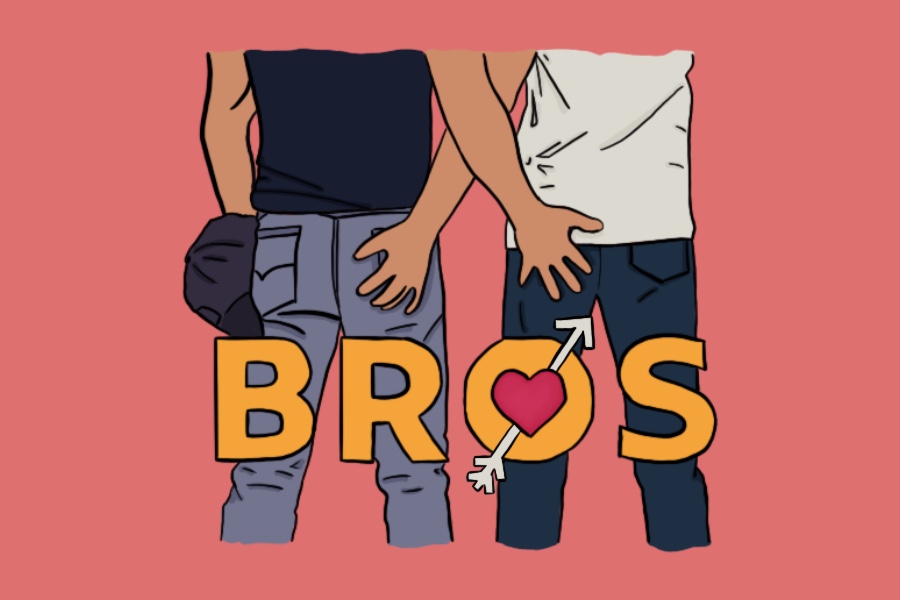Reel Thoughts: Alum Billy Eichner’s new movie ‘Bros’ is a LGBTQ+ rom-com with personality
Illustration by Eliana Storkamp
“Bros” was released in theaters on Friday, Sept. 30.
October 2, 2022
“Bros,” the newly released feature film produced by and starring Billy Eichner (Communication ’00), begins with a monologue. Eichner’s character, Bobby, talks about the Stonewall Riots as a catalyst for the modern pride movement, gay movies and his own love life in about three minutes at hyperspeed, while somehow managing to be grumpy the whole time.
Bobby’s speeches and the ways they reveal his personality are the heart of the movie. “Bros” follows Bobby as he navigates his career and falls in love for the first time, but the moments when we see inside his head prove to be the most poignant. In one particularly striking moment, Bobby reveals his confidence is a hard-earned response to the homophobia he’s wrestled with throughout his life.
As the movie progresses, his monologues evolve from annoyed, “Fleabag”-esque tirades to vulnerable confessions of his thoughts and feelings, often addressed to his romantic interest, Aaron (Luke Macfarlane).
It’s important to note Bobby is an annoying person. But rather than being a detriment, the annoying and persistent oversharing of Eichner’s character is an essential element which permeates every aspect of the film.
What makes “Bros” so good is that it marries the universal with the specific. As Bobby states at the beginning of the movie, a gay relationship is not a straight one with different labels tacked on: It’s a different dynamic with different challenges to navigate, albeit just as happy and just as capable of a fairy-tale ending.
Those challenges become most evident when Aaron brings his family to New York City for Christmas and asks Bobby to “be a little less himself” while they’re visiting. When Aaron tells Bobby to “tone it down” in front of his family, it’s not the same as when someone in a straight relationship is embarrassed of their partner.
Aaron’s request carries the weight of a fraught history, one in which LGBTQ+ people have consistently been asked to suppress their personality for the sake of being more palatable to straight audiences — and it’s a history you can hear when Bobby calls him out for it.
The movie is filled with small moments like these that emphasize “Bros” is not a straight movie turned into a gay one. Instead, it becomes most emotionally resonant when it leans into the details that makes Aaron and Bobby feel like real characters rather than stand-ins for a straighter cast.
At the same time, this is not a tragic, straight-actors-playing-gay-cowboys dramatic movie. The rom-com references are plentiful, the jokes are hilarious and Aaron and Bobby’s chemistry makes even the most ridiculous, sappy moments (a Garth Brooks-style serenade at a museum opening, for example) emotionally satisfying.
Eichner’s film is, in many ways, a love letter to current-day LGBTQ+ culture. Bobby’s job involves curating a new museum of LGBTQ+ history in New York City, and he spends much of his time bickering with colleagues about how to recount the history of queer life.
Through characters like his colleagues and friends, “Bros” zeroes in on LGBTQ+ life in New York City and all of its joy, idiosyncrasies and extremely specific pop culture references. Although he complains about his job and coworkers, at one point literally tearing a pride flag in half (while narrowly missing a larger-than-life bust of Pete Buttigieg), Bobby tells them at the end, “You’re the only group I’ve loved being a part of.”
“Bros” is a movie that refuses to “tone it down” to pander to a straight audience. This becomes its strongest aspect as the dynamics of Bobby’s relationship mirror his search for a final exhibit in his LGBTQ+ museum, which he eventually finds, thanks to an idea from Aaron. By breaking out of a traditional rom-com formula, the film’s plot feels much more free, and thus the happy ending feels newly won.
Email: [email protected]
Twitter: @MikaEllison23
Related Stories:
— Reel Thoughts: ‘A League of Their Own’ is a baseball show that finds its beating heart off the field
— Reel Thoughts: “Do Revenge” ushers in a new age for teen comedies
— Podculture: Love, Actually? Why rom-coms are our guilty pleasure


